Examples of Decision Making Process
Decision making is a crucial skill that we use every day to navigate through life’s challenges. Here are some examples of the decision-making process:
Buying a New Car
When deciding to buy a new car, you may consider factors such as your budget, desired features, brand preferences, and fuel efficiency. You might research different car models, compare prices, read reviews, and test drive multiple vehicles before making a decision.
Choosing a College Major
Selecting a college major involves evaluating your interests, skills, career goals, and job market demand. You may seek advice from career counselors, take aptitude tests, explore different majors’ curriculum requirements, and consider potential earning potential before making your choice.
Planning a Vacation
Planning a vacation requires decisions on destination, travel dates, accommodation options, activities to do, and budget considerations. You might research travel destinations online, read reviews from other travelers, compare prices for flights and accommodations before finalizing your itinerary.
Hiring an Employee
When hiring an employee for a job opening in your company, you need to review resumes, conduct interviews with candidates, check references and qualifications. You may also assess their skills fit with the team culture and evaluate their potential contribution to the organization before extending an offer.
These examples illustrate how the decision-making process involves gathering information, analyzing options weighing pros and cons before making a well-informed choice.
7 Key Steps to Enhance Your Decision-Making Process: From Clarity to Review
- Define the decision to be made clearly.
- Gather relevant information and data.
- Consider all possible options or alternatives.
- Evaluate the pros and cons of each option.
- Make a decision based on logic and reasoning.
- Implement the decision effectively.
- Review and learn from the outcomes for future decisions.
Define the decision to be made clearly.
To make effective decisions, it is essential to define the decision to be made clearly. By clearly outlining the decision at hand, you can focus on the specific problem or choice that needs to be addressed. Defining the decision helps in understanding the objectives, criteria for evaluation, and potential outcomes. It sets the foundation for a structured decision-making process by providing clarity and direction, ultimately leading to a more informed and successful decision.
Gather relevant information and data.
To make effective decisions, it is essential to gather relevant information and data. Whether choosing a new car, selecting a college major, planning a vacation, or hiring an employee, having the right information at hand can significantly impact the outcome of your decision. By collecting pertinent data, such as prices, reviews, qualifications, and performance metrics, you can make informed choices that align with your goals and priorities. Gathering information allows you to analyze options more thoroughly and increases the likelihood of making a well-considered decision.
Consider all possible options or alternatives.
When engaging in the decision-making process, it is essential to consider all possible options or alternatives before making a choice. By exploring a wide range of possibilities, individuals can weigh the pros and cons of each option, evaluate potential outcomes, and make a more informed decision. Considering all possible alternatives allows for a thorough analysis of the situation, leading to a more comprehensive understanding of the available choices and ultimately helping in making the best decision possible.
Evaluate the pros and cons of each option.
When making decisions, it is essential to evaluate the pros and cons of each option carefully. By weighing the advantages and disadvantages of different choices, you can gain a clearer understanding of the potential outcomes and make a more informed decision. Considering the pros can help you identify the benefits and opportunities that each option offers, while analyzing the cons allows you to recognize potential drawbacks or risks involved. This process enables you to make a balanced assessment of your options and choose the one that aligns best with your goals and priorities.
Make a decision based on logic and reasoning.
When making decisions, it is important to rely on logic and reasoning to ensure a rational and well-thought-out choice. By considering the facts, analyzing the potential outcomes, and weighing the pros and cons of each option, you can make a decision that is grounded in sound logic. Emotions and biases can cloud judgment, so by approaching decisions with a logical mindset, you can increase the likelihood of making a decision that aligns with your goals and values. Trusting in logic and reasoning can lead to more consistent and successful decision-making outcomes in various aspects of life.
Implement the decision effectively.
Implementing the decision effectively is a crucial step in the decision-making process. Once a decision has been made, it is important to take action promptly and efficiently to ensure that the desired outcome is achieved. This may involve creating a detailed plan, assigning responsibilities, setting deadlines, and monitoring progress closely. By implementing the decision effectively, you can maximize its impact and increase the likelihood of success. It is essential to follow through on the decision-making process by executing the plan with dedication and commitment to achieve the desired results.
Review and learn from the outcomes for future decisions.
It is essential to review and learn from the outcomes of our decisions for future guidance. By reflecting on the results of our choices, we can gain valuable insights into what worked well and what could have been done differently. This process of self-assessment allows us to refine our decision-making skills, avoid repeating past mistakes, and make more informed decisions in the future. Embracing this practice enables us to grow and evolve as individuals, continually improving our ability to navigate through life’s complexities with greater wisdom and clarity.



